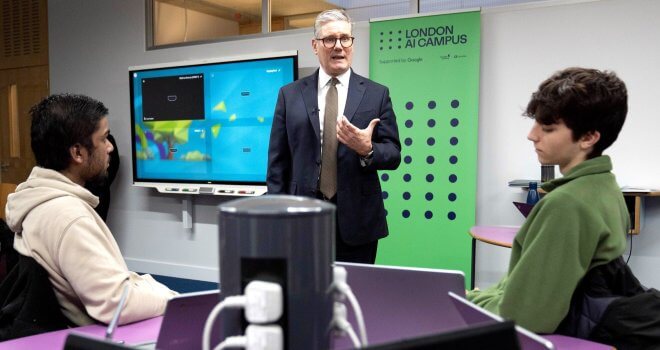How AI Can Make Business Pitches More Effective

Many of us are all too aware that buyers can often show up to pitch presentations with as much knowledge – if not more – than those who are pitching to them. Buyers bring forensic accounts of their unique business challenges and are familiar with the solutions available to them.
They feel like they’ve seen it, heard it, and done it all before. So what can sellers do to reclaim the power balance, and carve out an assured, knowledgeable and – most of all – additive role in each and every sales journey?
In my view, it all starts with an effective pitch. But, defining a successful pitch is complex, and it’s about more than the end result of winning the contract or account – albeit that is critical to business success.
Yet delivering pitches in an engaging, exciting and compelling way is a challenging skill to master. Often, there is a tension between how much focus is placed on developing the content of a pitch versus the time spent perfecting delivery.
A pitch must be confident, impactful and pacy. It should capture a buyer’s attention, build trust and leave a curiosity gap. A great pitch doesn’t happen by accident – it takes planning, preparation, practice and feedback.
However, in a target-heavy, time poor environment, sales managers and leaders aren’t always equipped to provide the thoughtful, attentive evaluations and personalised feedback that help sellers to reach pitch mastery.
In some cases, training isn’t offered at all, and there’s a misguided expectation that employees should be inherently good at pitching.
This is where AI comes in. Its benefits are almost limitless when it comes to the intersection between content and coaching best practice, and particularly in helping employees to perfect their pitches.
Through its unique feedback capabilities, AI can provide a real time, personalised evaluation that genuinely helps employees to improve their pitch quality, all while reducing the burden on managers to constantly coach their teams. Harnessing such technology and employing good practice upweights pitch value, helping to foster better buyer / seller relationships and ultimately close more deals, faster.
Building confidence
For many, the biggest hurdle to delivering a successful pitch is confidence. Pitching can be overwhelming and intimidating for even the most seasoned professional – depending on how confident and equipped they feel in front of their audience. And it’s not just new employees who need the investment of training and coaching; even those who’ve delivered long service need to keep their pitching skills sharp, invigorated and engaged if they are going to win over the hearts and minds of their customers and prospects.
Thanks to AI, the days of endless pitch practice while clamouring for a manager’s time to download feedback are numbered. And so too are the missed opportunities that befell buyers lacking the requisite coaching from their senior leaders.
Thanks to the AI capabilities baked into the Showpad operating system, sellers can record their pitch rehearsals and receive real-time, actionable feedback on their performance. An AI analyses pitch delivery, and provides direct feedback on areas of improvement. ‘Pitchers’ can implement this feedback right away, and re-record pitches continuously until they’re perfect.
This helps employees improve, raising the bar every time they deliver a pitch. In fact, 62% of people who sell a product or service agree that, “the feedback and coaching I receive helps improve my performance” (Forrester), bringing them ever closer to sealing the deal.
Improving quality
At this point, we might be questioning what type of feedback AI can offer to someone delivering a business pitch, as they diligently practise pitching. Remarkably, AI can capture intricacy and nuance in a way that rivals a human. It can assess the pace of a pitch, how fast or slow the narrative is, and whether it’s understandable. It can also assess silences between speech, and give advice on how and when to add or remove pauses for more impact. AI can even assess enthusiasm – analysing the tone of the pitch, and whether more passion and zest are required. This is fundamental to galvanising buying engagement. And while enthusiasm can feel subjective, AI provides a neutral and wholly informed assessment.
AI can also feed back on the non-verbal aspects of a pitch – and has the intelligence to take into account cultural nuances. This is critical when we consider that buyers don’t just listen to a pitch, they watch it too. Body language is key to evaluating the credibility, sincerity and knowledge of the person pitching, and AI can provide guidance across the board.
This tangible feedback loop empowers pitchers to continuously improve, training themselves almost autonomously to be better each and every time.
Content plus coaching
But it’s not just coaching in which AI can power up a seller. In every pitch situation, pitchers must be prepared to answer ad hoc questions. But they might not always have the right knowledge at their fingertips, and that can quickly undo their confidence and buyer trust, potentially scuppering a business win.
This is where AI can leverage someone from good to great. The intelligence of AI means that pitchers can quickly surface answers to specific buyer questions. There is no sifting through pitch decks to try to uncover answers – which instantly erodes the pace of the presentation, the nature of the interaction and the credibility of the seller.
AI is so clever, that it will present answers that have been used by the top sales performers in a given organisation – for further reassurance that the person pitching is being furnished with the best possible, most compelling, tried and tested response.
Here, the true value of a combined content and coaching capability comes to life. The pitcher is supported on all fronts, with no weakness left exposed.
However, it is also important to note that while AI can enhance the value of genuine human interaction, it can’t replace it. Empathy, creativity, and human ingenuity are critical skills that distinguish exceptional employees from the rest. The human touch remains a cornerstone of businesses, even as AI empowers us to scale new heights.
By harnessing the power of AI to augment the seller, pitch performance is elevated, new levels of productivity are unlocked and stronger customer connections are forged. AI is indeed a transformational force that is propelling businesses toward greater success in deal closures than ever before.
Tony Grout is Chief Product Officer at Showpad.




